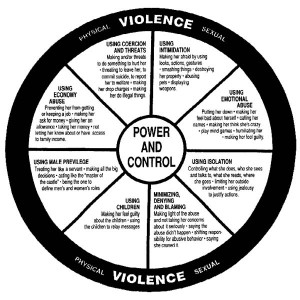(Originally posted September 2014)
And the blame continues.
Twitter & Facebook abound with it. Some claim with surety that they’d leave after the first minute a man touched them. Other wonder (with an air of superiority) why Janay Rice married Ray Rice in the first place (often accompanied with gold-digging, victim-blaming reasons.) Many question her ‘role’ in the situation—wondering why she stayed, sat next to him, tweeted support, etc, etc, etc.
Everyone has an opinion about and questions about Janay Rice. Why, why, why. I pray someone is there for her, helping deflect the meanness and judgment. I worked in the field (working with batterers) for ten years. I could write pages of ‘why women stay’—explaining how women become trapped by violent men, but instead I provide the above link, and concentrate on the important question we should be asking:
Why did Ray Rice, this 218-pound professional athlete, pound on his wife, the mother of his child?
For years I sat in church basements listening to men speak about their violence towards woman. I worked in a Certified Batterer Intervention Program where men blamed their violence against women on everything from invisible buttons their unreasonable wives pressed, to whiskey and beer.
These men weren’t different from the bad boys to whom I’d once been drawn. I craved them before, but never again. My father tried to kill my mother—maybe that’s why I switched from dating these ‘bad boys’ to offering them education, and education that offered tools for change, but they had to choose to use them.
They fought the idea that they could control themselves. Thinking themselves victims of invisible buttons was more comfortable than admitting they chose violence to get their way. And what did they want? Why did cheeks get shattered and tender skin become black and blue?
Money, sex, too-cold food. When honest, they admitted they simply wanted her to shut the “f” up. They didn’t have the goal of breaking a bone. They had goals like hot suppers and sex and met them the quickest way they knew: fists and raised voices.
The curriculum included drawing triangles with chalk to help the men look at their belief system. During this lesson on the hierarchy of power, we’d use different ‘systems’ so they could identify the ways they classified people. Schools, corporations and prisons were just a few of the organizations we sliced and diced.
And family.
When asked to define the layers of family, the woman were on the bottom of the heap. Some men argued that the women rated a place above the male children, but they were always wedged under the husbands and fathers. Men who’d grown up in single mother households still stuck the father figure on top.
This doesn’t come from the air.
Honestly? I got shaky watching the video of Ray Rice beating on his wife. One of my novels, The Murderer’s Daughters, revolves around young girls witnessing their father murdering their mother. I worked with men who savagely beat (and some murdered) their partners. My father tried to kill my mother, and still I try to pretend that it’s not happening. If I attempt to live in this fantasy world, how deep do others bury it? How many of us try to pretend it’s not happening, that it can’t happen to us, and instead think of reasons why she stayed, why it happened to her, but could never happen to us.
But it’s not true. There’s an awful lot of woman-hating in the world, and it’s all too acceptable. And men who batter and kill their partners are usually self-pitying and see themselves as victims —victims with fists. For these men, it’s all too comfortable to step on someone else’s head to lift oneself up.
The men I worked with, after being arrested for hurting their wives, usually claimed good reason. “She pushed my buttons.” “She was being a bitch.” “She knows I hate it when she … ”
I’d ask them if they ever punched their boss, and they’d laugh as though I were crazy.
“Don’t you ever get mad at your boss?” I’d ask. “Don’t they push your buttons?”
“Of course, but I don’t hit them.”
“Why?” I’d want to know. “Do you love your boss more than you love your wife?”
Usually they’d open their mouth and sputter, not knowing what to say. That’s when we’d go back to the hierarchy of power.
It’s easier to step on the person on the bottom, and we’re still sadly in a world that places wives, girlfriends, daughters and mothers on the bottom rung for the crime of being female in this world.
There’s a lot left to teach our children, such as notions that equality can equal life, and bring authentic relationships. Hitting, yelling, pushing–these are all bad. It doesn’t make you big and manly. It makes you small and mean.
So why did Janay Rice stay?
It doesn’t matter one bit.
All that matters is why Ray Rice punched her, and why he chose the path of anger, violence, and meanness. How he can learn he has control. Whether he chooses to use it.
It’s on him.
